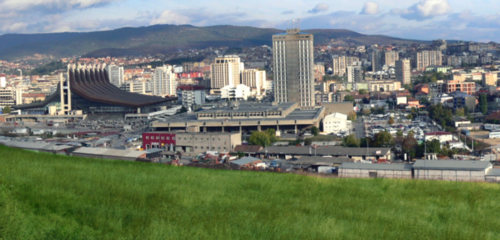 Pristina, capital of Kosovo and home to the American University of Kosovo. (Image courtesy of Wikimedia Commons)This is an interesting development: a heretofore unnoticed article from Dartmouth’s Office of Public Affairs announced on November 17 that Dartmouth has signed an agreement with the American University in Kosovo (founded in 2002) to provide advice on curriculum development and accreditation. This is now the second such relationship that Dartmouth has with an international AUK; the first was with the American University of Kuwait, with whom Dartmouth has had a “Memorandum of Understanding” since 2003 that provides for exchanges of administrators, faculty, and students (of whom I was one) between Dartmouth and Kuwait. The purpose there is to support a fledgling liberal arts institution in the middle of a region where liberal arts learning is largely a foreign concept.
Pristina, capital of Kosovo and home to the American University of Kosovo. (Image courtesy of Wikimedia Commons)This is an interesting development: a heretofore unnoticed article from Dartmouth’s Office of Public Affairs announced on November 17 that Dartmouth has signed an agreement with the American University in Kosovo (founded in 2002) to provide advice on curriculum development and accreditation. This is now the second such relationship that Dartmouth has with an international AUK; the first was with the American University of Kuwait, with whom Dartmouth has had a “Memorandum of Understanding” since 2003 that provides for exchanges of administrators, faculty, and students (of whom I was one) between Dartmouth and Kuwait. The purpose there is to support a fledgling liberal arts institution in the middle of a region where liberal arts learning is largely a foreign concept.
The press release makes it sound like a similar relationship will be established in Kosovo:
Opportunities for collaboration include “faculty exchange and mentoring programs; consultation on academic and administrative matters; internships” and “scholarly activities that will advance understanding of liberal arts, culture, business education, and medicine, particularly as it relates to the Balkans.”
And Laurel Stavis, one of the coordinators of the Dartmouth-American University of Kuwait relationship, has also been selected to direct this joint effort with AU Kosovo. According to the release, Dartmouth’s interest in Kosovo grew out of the work of Dartmouth Med School professor emeritus James Strickler, who has been traveling to Kosovo to provide medical treatment ever since 1999, when Kosovo was in the throes of its war with Slobodan Milosevic’s Serbia.
Overall, this project sounds like an admirable extension of Dartmouth’s liberal arts ethos (and brand name) into a new, unstable, and educationally needy country.
But there’s something about this that doesn’t add up: the American University of Kosovo already has a partnership with the Rochester Institute of Technology. In fact, graduates of AUK receive an RIT degree. (RIT has degree-granting agreements with other colleges in Croatia, the Dominican Republic, India, and the UAE as well.) If AUK already has this very close relationship with an American college, why does it need us?
Indeed, from the sound of it on AUK’s website, AUK and RIT are less interested in providing liberal arts education than they are in providing more technical and vocational training:
RIT…offers numerous academic programs that focus on the uniquely American concept of career education, which is a hands-on, experiential system for creating ‘workforce-ready’ graduates in business, technology, and industry.
Furthermore, it appears that AUK only offers five majors or ‘concentrations:’ management, economics, public policy, media and graphic communication, and information technology. That doesn’t quite sound like a broad liberal arts and sciences curriculum as we would know it.
Unfortunately, it seemed to me at the American University of Kuwait that a similarly limited concept of the ‘liberal arts’ obtains at that university, where most students major in business or graphic design, and where course offerings in the humanities, social sciences, and natural sciences usually take a back seat to vocational training.
It will be interesting to see whether or not Dartmouth’s relationship with the American University of Kosovo makes a notable impact on the latter’s curriculum and approach to education. Let’s hope for both our institutions’ sakes that it does.
— Charles Dameron

Be the first to comment on "Our New Kosovar Cousin"